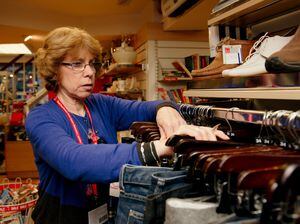Why those charity shop cast-offs are diamonds in the rough
Giving to and buying from charity shops is a cheap way to dress well – and one expert today explains why it also helps support people thousands of miles away.

There they were sitting on a shelf in a Shrewsbury charity shop - four brand new shirts all in my size and all in their wrappings, writes Mike Haynes.
I knew they retailed at £25 each but they were asking £4.99 each. I took the plunge into the world of charity shop clothes buying. I bought three and left the fourth for someone else. I am not that greedy.
I know what you are thinking - you couldn't wear someone else's clothes. But that is the way we lived in the past. It is still the way that 70% of the world's population live.
Only in very rich countries do we buy first hand. And only in rich countries do we spend so much on stuff that we end up giving loads of it away.
It took me a while to think it through. I remember hand me downs from my childhood. But I only buy top quality. Yesterdays' prize was a Pierre Cardin shirt in Newport that, if it had been worn at all, had only been worn once or twice. I got it for £1.99.
But what about the person who had them before? I don't really care. When I go to a hotel, I sleep in bedding that other people have slept in. I dry myself with a towel that other people have used. When I eat out I use other people's crockery and cutlery. I have worn hired clothes for a wedding as a mark of style. So what is the problem of second hand clothes?
We are said to have around £10 billion of largely unwanted clothing in our wardrobes and drawers. There is rather more on one side than the other. Twice as many clothes are made for women as men. But however you look at it we simply have too much and the piles are getting bigger.
Work clothes get worn a lot. We often wear our favourite casual clothes like jeans, tee-shirts and trainers until they are worn out. But much of the rest is lucky to get a wear at all. Around 25% of the clothes are never worn because we buy them in the hope of losing weight. Some we don't wear because we simply buy too many. Some we bought for a special occasion. The average dress is said to be worn three times.
So when stuff gets to the charity shop it is in pretty good condition. There it is sorted and a tiny percentage goes out to be sold to customers. The larger part goes out through the back door to commercial clothing companies. For them it is very big business. Some of it is used for rags but much of it is sorted and sold on to merchants who export it to poorer countries where it is sold in markets.
People are often shocked when they learn that what they give away is sold to people in poor countries. But actually giving it away or selling can be a bit of a problem. Think about people in the poor world trying to develop their own industries. They have to compete with cheap clothing from China, Bangladesh and Vietnam. Then they also are crushed by the avalanche of cheap second hand clothing. In some countries the situation is so bad that imports of second hand clothing have been banned.
Brand
What is left in the UK shops is the best. That is where I come in. I check the size of a shirt say, check the labels to find the best, the collar, buttons and make sure that there are no sweat marks. The more expensive the brand, and the cheaper say the shirt, the bigger the smile with which I buy it.
Where do I draw the line? Well I don't buy second hand underwear. I know that is not really logical but that's me. In the larger part of the world people are not so choosy about this either. In the markets in poorer countries men and boys tend to prize second hand football shirts. But women prize western bras. They are big money for the retailers. In the Nigerian markets they are called "OK bras".
So buying stuff in Shropshire's charity shops makes more sense than you think. I am not adding to the overuse of the world's resources. I am recycling. I am getting better value than I would ever get in a shop. And perversely I might even be saving someone's job in Africa.
It may be a crazy world but if you see me wearing a posh shirt that you gave away, then just be grateful that someone is getting the benefit of the money you wasted. I have never been better dressed. You might like to tell me how smart I look.
* Mike Haynes is an emeritus professor at the University of Wolverhampton Business School.





